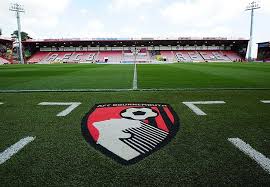By David Owen
October 5 – AFC Bournemouth, the Russian-controlled south coast minnows who have become an established and increasingly accomplished Premier League force under Eddie Howe, their bright young manager, have put plans for a new stadium on hold.
A club statement, released on Thursday, stressed the importance of remaining competitive in England’s top flight and acknowledged being “overly optimistic” that a new stadium would be completed by the summer of 2020.
It went on: “Any future developments will be undertaken around a healthy financial strategy that does not take away our ability to perform at our strongest levels on the pitch and risk what has been achieved to date.
“With regard to the developments, when we have a reliable timeframe we will make those facts known.”
The club’s ground – Dean Court, or the Vitality Stadium as it is currently known – is tiny by Premier League standards, with a capacity below 11,500.
Largely because of this, the Premier League broadcasting deal is massively important to the club. Premier League income accounted for a staggering 91% of total turnover in the year to end-June 2017 when the Cherries reported pre-tax profits of £14.6 million.
Thursday’s statement acknowledged that “being a Premier League team brings financial rewards”, but went on: “Every penny of those funds, together with significant, additional investment from the club’s shareholders, has been put in to ensuring AFC Bournemouth remain at this level.”
It alluded to “the purchase of land for the development of a new multimillion-pound training ground”. The 2016-17 accounts disclosed that the club paid £3.8 million in August 2017 to secure “a potential site for the future development of the football club’s facilities”.
Bournemouth is controlled by Maxim Demin, a Russian investor who made his fortune trading petrochemicals. While the statement spoke of a “strong vision” for the future of the club and gave no explicit reason to conclude that the present ownership’s interest might be dwindling, it comes at a time when political tensions between Russia and the UK appear to be mounting.
In August, Alisher Usmanov, the Uzbek-born Russian billionaire, sold out of Arsenal. Rumours have also been swirling around Roman Abramovich’s continued ownership of Chelsea, although the club is said to be insistent he has no plans to sell.
Documents in Companies House indicate that Demin himself stood down from two UK directorships unrelated to football in March.
In the circumstances, Bournemouth fans can perhaps take comfort from a report this week in the Financial Times that Demin has bought a North London-based recording studio complex established by Beatles producer George Martin. The owners were said to have been looking for a buyer who would invest in the business.
While it seems conceivable that money spent on the studio might otherwise have gone to the football club, this would at least indicate that Demin and his business interests have no plans to retreat ‘Back in the USSR’.
Contact the writer of this story at moc.l1713870904labto1713870904ofdlr1713870904owedi1713870904sni@n1713870904ewo.d1713870904ivad1713870904

